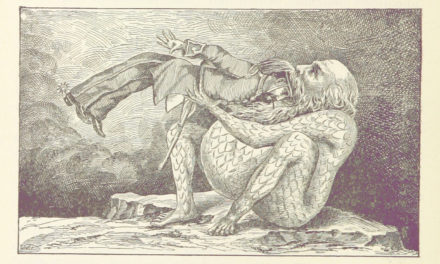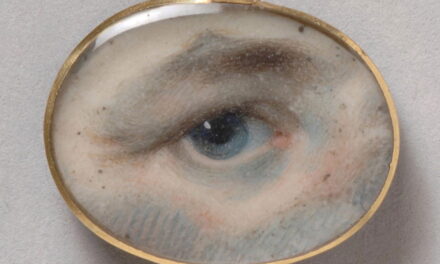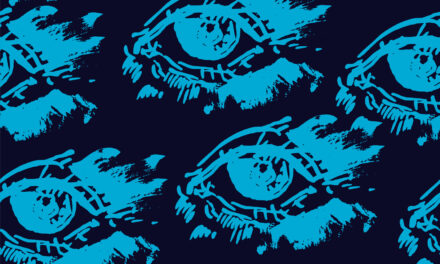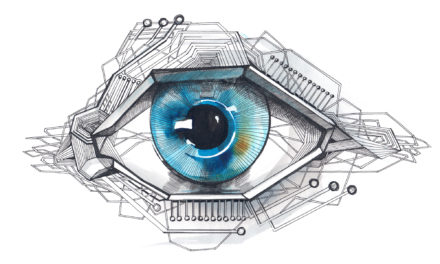The One You Love
by Siobhan O Ekeh Issue 15: Superstition | 3,512 words
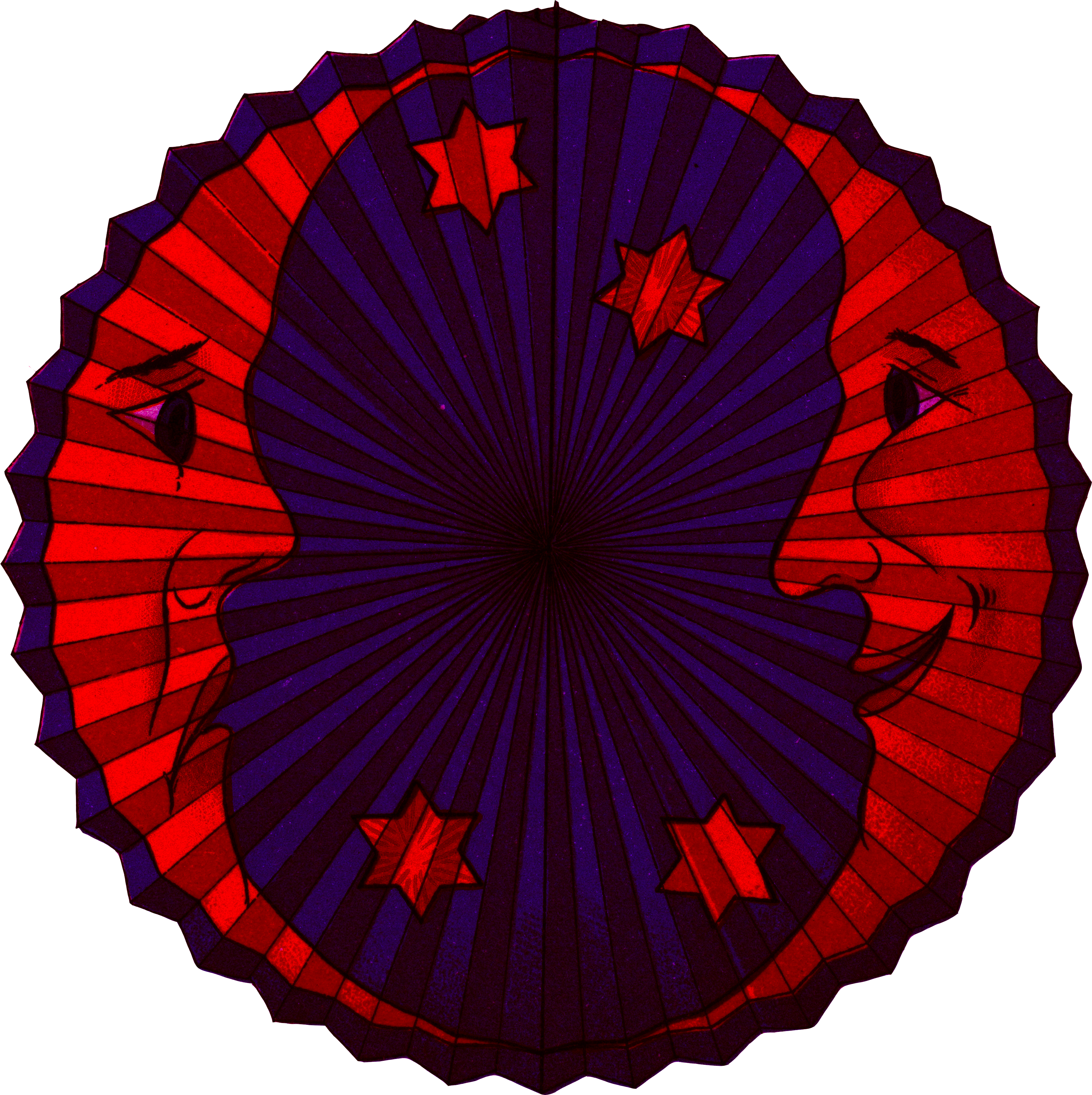
1880. From Papierlaternen-Fabrik Riethmüller. The Metropolitan Museum
Iroko was born nine months prematurely, as the Devil had a more immediate use for her than a typical incubation period would’ve allowed.
This fact has been corroborated by both Iroko’s mother and grandmother on multiple occasions. Iroko thinks it rather inappropriate to instill in a young girl that the circumstances of her birth were facilitated solely in accordance with the plans of the Devil, but she forgives those two because she is a forgiving girl above all else.
Grandmother first burdened her with this story the evening before Iroko’s ninth Halloween as the waxing gibbous moon turned its pale cheek to their side of the sky. Iroko sank between the cushions of Grandmother’s starchy floral couch and squinted through the lacy curtains, trying to telepathically signal for her father to pull into the driveway and rescue her from Grandmother’s yearly anti-Halloween speech.
“Do not wander outside tomorrow night, Iroko. Spirits and witches will be roaming the streets. You must not invite evil things upon yourself.”
Iroko yawned, lulled into irritated exhaustion by the sitting room’s dim lights and smothering peony scent. “I’m going to be Princess Peach for Halloween.”
Grandmother wrapped a hand around her wrist. “Do you know why the heathens of this country open their doors and wear masks on Halloween? They wish to invite evil spirits into their homes. Into their hearts.”
The bulging of Grandmother’s red-veined eyes was starting to frighten Iroko. The driveway remained empty. “Papa says there’s no such thing as spirits.”
“Your father. He is too American. The devil hides from Americans, but to Africans, he shows himself plainly.”
Iroko slumped down on the couch. “I have to use the bathroom.”
Grandmother leaned close enough for Iroko to smell the pomade of her shiny black wig. “Your mother should know better. She has felt the Devil’s work herself. She has not made known to you the evil that slipped from her into you at the moment of your birth.”
“I’m not evil.”
“I witnessed it with my own eyes.” The muscles in Grandmother’s hand flexed like a heartbeat around Iroko’s wrist. “Your mother was not even pregnant. She was thin, no swelling in her breasts or belly. We went to the market for vegetables on a Sunday morning, your mother, Asaroyoma and me. Oyabevwe would not stop looking over her shoulder.”
Grandmother looked over her shoulder then, sending a shiver down Iroko’s spine. Iroko looked behind her too and the shadows looked back.
“When we reached the stall, Oyabevwe would not help me choose vegetables. She stood with her hands on her stomach and her back arched, heaving. I thought, my poor daughter is ill. She needs water. I called for the stall keeper to get a chair and something to drink.
“The man had hardly gotten to his feet when Oya began to scream so loudly that every person in the market fell quiet and turned toward her. Like the squawk of a half-beheaded bird. I will never forget. She suddenly fell back in the dirt and—oh, if you saw what I saw, Iroko, you would never again doubt the power of the Devil. Her stomach swelled like a balloon, ripping her dress, making her skin translucent as it stretched. Sharp limbs jabbed her from the inside—a foot, a hand, the crown of a head, hitting and kicking, terrible imprints. Bigger and bigger. Oh, how she screamed. Nonstop, one long, awful sound. I saw you pressing through her belly, your crumpled face, how you turned yourself around to kick out from the back of her womb, and burst out head first into Asaroyoma’s arms. You did not have to be pushed out like a baby should. You crawled out. It was not your mother who labored over you, but the Devil himself.”
Iroko’s heart raced so fast she thought it would cease to beat. Her mind filled with the terrible image of a pointed, sneering face embossing the skin of a distended stomach like a person being smothered in a plastic bag. She burst into floods of tears that could not be stemmed even when her father finally arrived and carried her to the car. At home, her mother demanded to know what she was carrying on about and Iroko burbled out the story between sobs. Oyabevwe, glancing back and forth between her daughter and a slasher movie on TV, let out a long sigh and nodded. “Drink some water,” she said. “You’ll dehydrate.”
So, twenty-one years ago today the devil ripped Iroko from her mother’s womb fully formed. Tonight, Iroko will celebrate this occasion by throwing the wildest party she can manage without getting kicked out of her dorm. But before that, she has morning plans. A tradition to keep.
Never one to feign modesty, Iroko stops to marvel at her own beauty in the mirror before leaving the dorm. She looks better today than she has in months. Her skin has warmed from sallow winter yellow into summer mahogany. The braided-down front of her hair makes the x-ray beams of her black eyes the center of attention rather than the storm cloud of curls resting on her shoulders. Her clinging lavender dress captures attention like a spring-loaded trap, drawing eyes to the thickness of her thighs and the delicate wells of her collarbones. Iroko leaves the dorm in thin heels and with a sleeve slipping enticingly over one shoulder.
Today, this dress is employed toward a very particular purpose. Iroko aims to create a certain effect when leaning in to speak to Asaroyoma over the breakfast table this morning, that effect being, hopefully, lovely beyond denial. Yes, Iroko is going to get exactly what she wants today. Twenty-one years has been long enough spent resisting the devil’s bidding. She’s finished trying to be a good girl. If she was born to be ungodly then, well, she’s going to start doing ungodly things.
Iroko thinks Oyabevwe would have a minor heart attack if she knew the designs her only daughter now has set on her childhood servant. Well, good. Oya having a heart attack wouldn’t be the worst thing.
In their home country, Oyabevwe was the heir to a massive fortune, and Asaroyoma, young and orphaned, was Oya’s only maid. Of course, Oya dragged her servant to the United States along when the family moved shortly after Iroko’s birth. Oya spent many years mockingly encouraging Asa to make something of herself in “the land of opportunity,” although she certainly never meant for Asa to take this advice seriously. Indeed, Asa has made something of herself, and is now well-respected among the artisans of the city for her quilts and textile artworks.
Perhaps as a punishment for this moderate success, Oya has decided that Asa should have to pay the family back for the years they clothed and fed her. In this way, Asa remains indentured. Oya shaves fractions off the debts she has imposed upon Asaroyoma in exchange for favors and chores. Iroko, feeling for Asa what she does, finds this utterly abhorrent and counts it among the reasons why she has blocked Oyabevwe across every line of communication.
Iroko has never discussed her birth with Asaroyoma, although sometimes when Iroko is being particularly difficult, Asa does confirm that Iroko was born into her arms, but volunteers no further details. “You realize I was the first to hold you in this earthly realm, child,” she says. “I should have snapped you in two pieces when I had the chance.”
Iroko has not been invited to breakfast this morning, even though she and Asa have had breakfast together on every one of Iroko’s birthdays to date. Too proud to text and ask if she should come, Iroko has opted to show up anyway and force Asa to take on the awkwardness of either accepting her or turning her away.
The last time Iroko heard from Asa was two weeks ago. Asa hasn’t posted on Instagram, and Iroko’s location app claims that “Asaroyoma is somewhere in this circle,” the circle being all of Brooklyn and the Lower East Side. Iroko knows Asa is alive because she has been saving recipes for whole-orange cakes and film photos of egrets to a Pinterest board called “Things to Think About.”
Asa’s silence is likely due to what Iroko said last time Asa cut her hair. Iroko often asks for haircuts she doesn’t need in order to satisfy her perverse desire to have Asa’s midriff at eye level. Most often, Iroko manages to suppress her downright inappropriate feelings toward Asaroyoma, but she does allow herself this one bit of degeneracy, watching Asa’s shirt hem rise away from her waistband as she leans over the crown of Iroko’s head. Asa’s bathroom smells strongly of mint, and Asa herself, darkly bitter—cinnamon, sage, vanilla, and tobacco.
This time, though, Asa asked for a favor in return.
“I need you to call your mother.”
Iroko’s stomach dropped. She would do almost anything for Asa, but not that. “No.”
“Iro, please. She’s been calling nonstop. She really wants to speak to you.”
“Well, tell her to piss off.”
“I can’t.”
“Why? What, is she paying you to get me to talk to her?” Iroko batted Asa’s scissors away and Asa went still.
“No. Of course not.”
“You’re not her servant anymore, Asa. She doesn’t own you. Make your own decision for once.”
Asa traced the scars on her cheeks and said, “You remind me of her, the older you get. She could be very cruel.”
There wasn’t much more to say after that. Iroko left without saying goodbye and hasn’t heard from Asa since.
Iroko thinks she probably shouldn’t let the behavior of a thirty-three-year-old woman with five gold teeth and a credit score under three hundred loom so large in her mind, but alas, she can think of little else.
Today the path toward Asa’s apartment sparkles with cleanliness, the trash picked up and piss stains power-washed away. The street is empty and the rats stand clear.
Until, a sudden shadow interrupts the sidewalk and startles a yelp from Iroko’s throat. She jumps back the way she does in reaction to rats, but this dark, skinny thing, stretching wide as if to block her path, is too large and still to be a rat. No, not a rat but a black cat like a hole in the glittering sidewalk.
Iroko has never seen a cat look so bad. Scabbed-over scratches and infected greenish cuts cover patches of missing fur. Pus crusts the cat’s eyes shut and one ear hangs loose at its corner, almost torn clean off. And, something Iroko has absolutely never seen before: the cat’s mouth has been stitched shut with a row of clean, black x’s, knotted at either corner like a repair job on a ripped shirtsleeve.
Iroko considers crossing the street. She isn’t an animal person, and has a certain aversion to blood and infected fluids. But, she cannot avoid a certain feeling of kinship with this creature, a fellow deadly omen, a bad sign. It will surely starve if she leaves it behind. Iroko clicks her tongue and the little victim scampers into her hands, fur rough as quills. “Oh, you devilish thing, you,” Iroko mutters. “Aren’t you just a cursed object.”
Believing herself unrealistically impervious to the physical dangers of the city, Iroko carries nothing sharp in her tiny purse with which to cut the thread. She hoists the creature beneath her arm.
Along the rest of her shaky-legged journey, Iroko can’t help thinking about the kind of person who would push a sewing needle through the skin of a living cat. She looks over her shoulder as if the cat’s assailant might be following a few feet back. Her pace increases minutely. A chill creeps over her shoulder.
Inside Asa’s gate, a vintage bicycle and a morning glory fight for control of a rusting stair rail. Grass has lost the battle to mugwort and aster. Iroko jogs the steps and rings the doorbell relentlessly.
Asaroyoma is home. Her wooden sandals clop across the tile and a jazz instrumental leaks from the open window. Iroko holds the cat ahead of her, a shield.
Asa opens the door unsmiling and only raises an eyebrow upon seeing Iroko. “Now what is this?” Her voice is low, sleepy, and she looks unreasonably glorious in a white nightgown and the wire-rims she wears only in the morning.
“It stopped me on the sidewalk,” says Iroko.
Asa sucks her teeth but relieves Iroko of the cat. She gives it a matter-of-fact once over before releasing it into the apartment. “Didn’t your mother ever teach you not to interfere with witchcraft, Iroko?”
Iroko grimaces at the mention of her mother. “Do you know what day it is?” she demands.
Asa blinks and seems to realize. “Oh. Yes, I do. I’m sorry.”
It pinches to hear that Asa really did forget, but at least Asa isn’t angry. Iroko isn’t being iced, she’s only being neglected. “Well, I thought we’d have breakfast like usual.”
“Of course, my love. Of course. I’m sorry.” Asa ushers Iroko inside.
Asa’s kitchen is much more of a mess than usual, dishes piled in the sink, pots and pans on the stove, crumbs on the counter. Iroko takes her usual seat by the window and startles when she finds the cat standing behind her feet, shivering.
Asa shucks and slices a bright red plum into Iroko’s palm, a pulpy excuse for a birthday gift. “You may have caught me at a bad time,” she says. “I’ve just had… company. Haven’t had the chance to clean up.”
“You could have texted.” Iroko eats ravenously from the cup of her palms. The way Asa says company tells Iroko exactly who has just been here. From the looks of the dishes, Asa cooked Oyabevwe a rather elaborate meal. Iroko bristles and fixes Asa with a tight-lipped glare. “I didn’t hear from you, so . . .”
“So, well, yes. I’m sorry.”
“Quit apologizing.” Iroko holds the cat between her ankles. “Can you cut the thread now?”
“I would prefer not to.” Asa wipes Iroko’s face and hands with a tea towel, frowning at the cat.
“It’ll starve.”
“I’m not one to put on myself a curse meant for somebody else.”
“Give me your knife, then. I’m already cursed.”
“Oh, not you too with this nonsense,” Asa snaps. “I’ve just about had it with all that. Why do you believe what your mother tells you about yourself?” Asa gets to her knees at Iroko’s feet and Iroko’s heart jumps to her throat. She’s never had Asa so close to precisely where she wants her. Really, Asa has knelt down for a better look at the cat, which she prods in the throat.
“What do you mean ‘nonsense?’” Iroko demands.
Asa shakes her head. “You’ve really come at a bad time.”
Iroko snatches Asa’s chin in her hand so sharply that Asa flinches. “No. Tell me.”
“Come with me,” Asa says. “I was just about to have a shower.”
Iroko follows Asa into the bathroom, unable to sort confusion from desire as Asa strips behind the shower curtain. The faucet squeals to life and Iroko lies on the bathroom floor, steam settling heavily over her face as Asaroyoma speaks under the cover of running water.
“Your mother has convinced herself you were born to cast a dark omen over your family. She would have you repent for your birth for the rest of your life. But I was there, you know. I was the first to hold you. Your mother calls you a curse, but to me, you came as a wonderful gift.
“I was only a girl then, twelve years old, and knew nothing but servitude. Your mother was sixteen, pretty as a pearl and careless, stupid. She became pregnant by a farmer from the family’s palm oil plantation, whom she considered to be beneath her. Although she enjoyed the thrill of consorting with him in secret, she would never marry him. She told me of her situation when she reached four months. We cut our palms and put them together, and she made me swear never to breathe a word. She wanted to be rid of the baby and left the details to me, as she left the details of all her problems back then.
“I sought help from the other servant women who gathered to drink and chat near the river once work was finished, our employers put to bed. There were many suggestions, some delivered with a cruel cackle—push her down the stairs, punch her in the stomach. The kinder women, the ones I knew well from the kitchens, suggested herbs to put in tea. A long wire at worst.
“One by one, the women drifted off to their own beds, but I remained by the river, shivering, afraid. The women had said any method would be painful and risky. The herbs would cause vomiting, a wire would draw blood. No matter what I did, Oya would blame me for causing her pain. I’d be punished brutally, even if I was successful. Oya, she could be so violent when she was angry. I feared that if she blamed me for hurting her in a way she’d never been hurt throughout her short, sheltered life, she might kill me and no one would even notice.
“Deep in the night when I was convinced I was alone, I felt a hand on my shoulder. I looked to my left and found a woman who should not have been there. My mother, who had died of illness many years before. She put her cool hand to my cheek and told me not to fear. This is not a burden but an opportunity to be free, she told me. I can see the paths ahead of you. If this baby is erased, you will die a slave to a cruel master. If she is born, your life will begin anew.
“Your mother says the devil had some use for you, but it was an angel of the Lord who appeared to me that night and told me how to bring you forth. I served Oyabevwe tea brewed from inductive herbs first thing in the morning. I thought it would take much longer to take effect. But that morning at the market, the most wonderful blue light subsumed the sky and Oya’s water broke right there before the vegetable stall. No, you were not born quite like a normal baby. You are indeed a thing of unnatural beginnings, my dear. You came very quickly, almost too fast for me to catch you as you fell from Oya’s womb. And you glowed like a meteor, not limbed and skin-bound like a baby at all, but so bright my eyes have never fully recovered from looking directly at you the moment I first held you in my arms. You were so indescribably beautiful, the greatest blessing ever bestowed upon me. And indeed, from that moment, not one life but two were truly allowed to begin.”
Iroko cannot respond past the sob blocking her throat, whether of relief or anger she cannot decide.
Asa emerges crystallized from the shower. She takes Iroko to her bedroom and settles her amongst crocheted blankets and quilts, scented the cinnamon and sage of Asa’s body, and finally, finally, her mouth is not just near but on Iroko’s skin, kissing her ankles and stomach, her palms, her thighs, words of praise muffled by the soft parts of Iroko’s body. The afternoon grows long and forgetful and sleep comes not at a time but at a temperature, the coolness of sunset.
Iroko awakens to a phone call. “You wicked thing,” her grandmother hisses. “You have killed your mother. I know you have. Your purpose, you’ve filled it now. Are you glad? Are you overjoyed?”
Under the kitchen table, the cat has turned on its back and died. Iroko cuts the thread with the plum knife and wrestles out what had been lodged within the cat’s immobilized throat. A white square, water damaged around the corners where the cat’s saliva has bled black ink into blue and sickly pink.
A photograph, a familiar face within a white border.
Young, glowering, eyes like x-rays, alive then, dead now.
Across the back, a messy scribble of text reads, Oyabevwe, to whom nothing shall henceforth be owed.
Iroko tucks the photograph back into the cat’s mouth and herself back into Asaroyoma’s bed. She traces the scars along the arms she has longed to return to for so many years and wonders, now that these hands are freed from gathering things for the debt collector, what they may hold instead. Iroko’s hands are free now too, finished with the bidding of the Devil or the Angel of God. She puts her new hands on Asaroyoma’s softly beating heart and wakes her lover with a shake.
“Something terrible has happened,” she says, and the day is as bright and possible as anything has ever been.
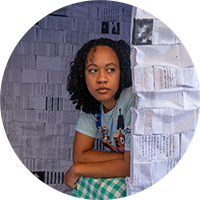
Siobhan O Ekeh
Siobhan Ekeh is a second-generation Nigerian American writer, artist, and educator living in Brooklyn. Her work often explores themes of the human/land and human/animal relationship, climate change, and colonialism. Her poetry has appeared in rainy weather days magazine and Strings magazine.

